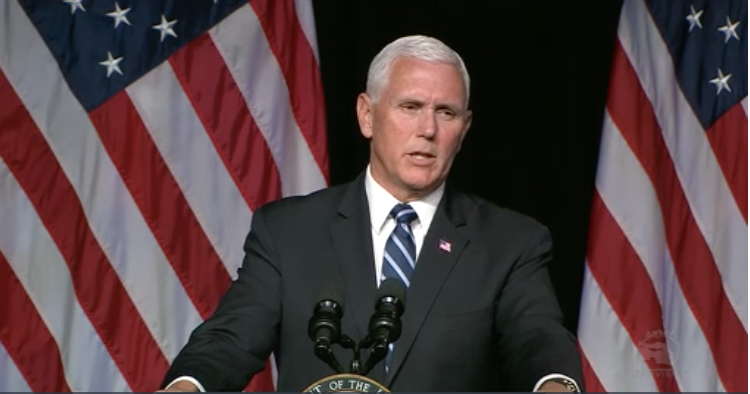By THERESA HITCHENS
Vice President Pence says administration’s 5G plans are key to innovation
 WASHINGTON: The Trump Administration’s plans for increasing access to 5G spectrum will help spur innovation in the space industry, Vice President Mike Pence told the Satellite 2019 commercial satellite industry conference here today.
WASHINGTON: The Trump Administration’s plans for increasing access to 5G spectrum will help spur innovation in the space industry, Vice President Mike Pence told the Satellite 2019 commercial satellite industry conference here today.
“President Trump has made it clear that the race to 5G is a race America will win,” Pence said. He pointed to the plan by the Federal Communications Commission to hold the “largest spectrum auction ever” in December as a key marker. And, Pence stressed, “we will make sure these 5G networks are secure.”
The administration has been concerned about the fact that Chinese company Huawei, which US officials see as a vector for Beijing’s industrial and national security espionage, is a leader in the global market with its low-cost 5G technology. Washington has been pressuring its allies abroad to reject Huawei as a provider. While some allies have gone along with the US, other such as Italy remain open to buying from Huawei. Indeed, the company’s participation in Western 5G networks is so controversial that British Defense Secretary Gavin Williams was fired last week over a leak to the press that the government’s secretive National Security Council had voted to let Huawei have some role as Britain builds its network.
Comments are due May 15 from industry on the FCC’s third planned auction of 5G spectrum, this time in the so-called “Upper” spectrum bands of 37 GHz, 39 GHz, and 47 GHz. A key question, one industry observer here told me, is how involved the satellite industry will be — as much of the 5G business takes place in the terrestrial wireless sphere. Still, industry experts believe there will be a role for satellite operators in 5G because it will be impossible for terrestrial networks to provide coverage everywhere, especially in remote areas.
Late last year Intelsat made waves by proposing that satellite operators share a larger portion of C-band spectrum with mobile operators for 5G service, and convincing, SES, the other largest user of C-band in the United States, to go along with the plan. Eutelsat and Telesat also signed on to this so-called C-Band Alliance — with the idea that the satellite industry should be managing the spectrum-sharing process rather than being dictated to (and getting paid for it to boot).
Pence, who chairs the National Space Council, said that the Trump Administration’s goal is “to give innovators in all industries access to spectrum you need to compete and win in global marketplace.”
However, Pence gave no details about how the Trump Administration’s proposals and the FCC’s so-called ‘5G FAST’ plan will help the satellite industry, or any other industry for that matter. Indeed, there is some skepticism about the readiness of the satellite industry to take advantage of a 5G network. “The first thing you need to know about 5G is that most of what you hear is lies and/or hype,” one industry observer said, only half joking. So far, the biggest interest for satellite firms is providing Internet of Things (IoT) services, but it is currently unclear how well they will be able to compete with terrestrial wireless providers.
The US government interest in standing up a 5G network nationwide is based on the promise of faster data transfer speeds with lower latency (delays from transmission point to receiver point), and increased connectivity to enable the widespread development of IoT. 5G also is expected to help enhance cybersecurity and data protection. But it is also driven by fears that other countries are ahead of the US on development of the 5G market, especially China. Currently, South Korea is the only country to have deployed a national 5G network
No comments:
Post a Comment